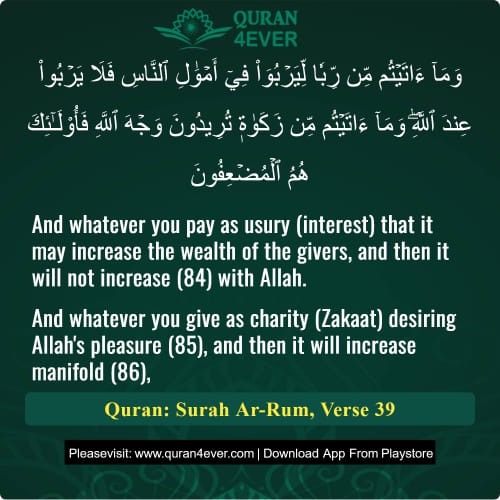
Transliteration:( Wa maaa aataitum mir ribal li yarbuwa feee amwaalin naasi falaa yarboo 'indal laahi wa maaa aataitum min zaakaatin tureedoona wajhal laahi fa ulaaa'ika humul mud'ifoon )
"And whatever you pay as usury (interest) that it may increase the wealth of the givers, and then it will not increase [84] with Allah. And whatever you give as charity (Zakaat) desiring Allah's pleasure [85], and then it will increase manifold [86]."
Here, riba (interest) is used in its literal sense, not its religious definition. This refers to gifts or presents given with the intention of receiving something greater in return.
Though permissible, such intentions carry no reward with Allah, because they are transactional, not spiritual.
The Holy Prophet ﷺ was specifically forbidden from giving gifts with such intentions. As Allah says: “And do not bestow a favour seeking a greater return” (S74:V6).
True gifts should be given solely for the pleasure of Allah, not for worldly compensation.
Charity (Zakaat) here refers to what is given to the needy purely for Allah’s pleasure, acknowledging their poverty.
If given to the wealthy, it becomes a present, not charity. Obligatory charity (Zakaat) is meant exclusively for the poor, while voluntary charity (Sadaqah) is also best directed to them.
The verse promises that charity given with sincere intention brings manifold increase from Allah.
While the increase may be twofold or more, this verse does not contradict others where abundant rewards are mentioned—it simply emphasizes that true gain is measured by Allah, not worldly returns.
The tafsir of Surah Ar-Rum verse 39 by Ibn Kathir is unavailable here.
Please refer to Surah Rum ayat 38 which provides the complete commentary from verse 38 through 40.
(30:39) Whatever you pay as interest so that it may increase the wealth of people does not increase in the sight of Allah.[59] As for the Zakah that you give, seeking with it Allah’s good pleasure, that is multiplied manifold.[60]
59. This is the first verse revealed in the Quran that condemned interest. It only says this: “You pay interest thinking that it will cause an increase in the wealth of the money-lender. But actually, in the sight of Allah, interest does not increase the wealth, but the wealth is increased by the payment of the Zakat.” Afterwards, when the commandment prohibiting interest was sent down at Al- Madinah, it was said: “Allah deprives interest of all blessing and develops charity.” For the later commands, see (Surah Aal-Imran, Ayat 130), and (Surah Al-Baqarah, Ayats 275-281). This verse has been given two interpretations by the commentators. One section of them says: Here riba does not mean the interest which is forbidden by the Shariah, but it means the gift or the present which is given with the intention that the recipient will return it redoubled, or will perform some useful service for the donor, or his becoming prosperous will be beneficial for the donor himself. “This is the view of Ibn Abbas, Mujahid, Dahhak, Qatadah, Ikrimah, Muhammad bin Kaab al-Qurzi and Shabi. Probably this comment has been made by these scholars for the reason that in this verse the only consequence mentioned of the act is that in the sight of Allah such wealth will not increase at all; if, however, it had meant the interest forbidden by the Shariah, it would have been positively said that it will be severely punished by Allah.
The other group differs from this and says that it means the same well known riba which has been forbidden by the Shariah. This is the opinion of Hasan Basri and Suddi, and Allama Alusi also has opined that the apparent meaning of the verse is the same, for riba, in Arabic is used in the same meaning. This interpretation has been adopted by the commentator Nisaburi also.
In our opinion also this second interpretation is correct, for the argument given in favor of the first interpretation is not enough for discarding the well known meaning of the word riba. In the period when Surah Ar-Rum was sent down, interest had not been forbidden yet. The prohibition was made several years afterwards. The way of the Quran is that it first prepares the minds for the thing that it has to prohibit at a later stage. About wine the only thing said in the beginning was that it is not pure food. (Surah An-Nahl, Ayat 67). Then in (Surah Al-Baqarah, Ayat 219), it was said that the harm of its sin is greater than its benefit. Then it was enjoined that the Prayer should not be offered in the state of intoxication. (Surah An-Nisa, Ayat 43). Then, finally, it was prohibited totally. Similarly, about interest here it has been only said that it does not increase the wealth, but the real increase is caused by the Zakat. After this, the compound interest was forbidden (Surah Aal-Imran, Ayat 130); and finally, interest itself was made absolutely unlawful. (Surah Al-Baqarah, Ayat 275).
60. There is no limit to this increase. The greater the sincerity of intention, the deeper will be the sense of sacrifice. The greater the intensity of desire for Allah’s pleasure with which a person spends his wealth in His way, the greater and more handsome will be the rewards that Allah will give to him. According to an authentic Hadith, even if a person gives a fig in the way of Allah, Allah will increase it to the size of Mount Uhud.
[1149]- The phrase includes several connotations, among them: a) that which is given as usury or interest, b) that which is given on the condition that it be repaid with interest, and c) a gift given with the intention of obtaining from the recipient greater benefit or a larger gift. [1150]- The meaning of ṣadaqah (voluntary charity) is included here. [1151]- Of their blessings on earth and their rewards in the Hereafter.

For a faster and smoother experience,
install our mobile app now.
Related Ayat(Verses)/Topics